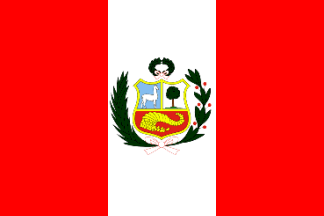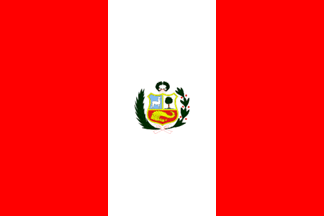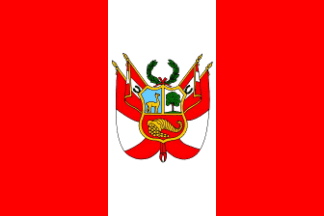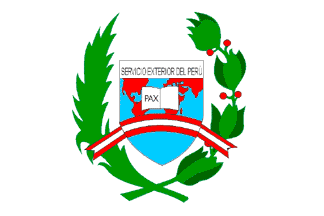
FOTW beschäftigt sich mit der Wissenschaft der Vexillologie (Flaggenkunde).
Alle auf dieser Website dargebotenen Abbildungen dienen ausschließlich der Informationsvermittlung im Sinne der Flaggenkunde.
Wir distanziert uns ausdrücklich von allen hierauf dargestellten Symbolen verfassungsfeindlicher Organisationen.
Last modified: 2021-08-25 by rob raeside
Keywords: pavellón nacional para izar | bandera de guerra | estandarte | ensign | naval | governmental | army | flag | coat of arms: horn of plenty | independencia | external service | diplomat | book | map | pax |
Links: FOTW homepage |
search |
disclaimer and copyright |
write us |
mirrors
Yachay
national holidays page showing: bandera nacional para izar
(national flag for hoisting), estandarte
(Standard) and pabellón nacional para izar
(national ensign for hoisting).
Missing: bandera de guerra (flag of war).
António Martins, 09 Jul 2006
Flag
page in the website of the Peruvian Ministry of External Relations;
explains the use of the four different national flags.
Joe McMillan, 05 Nov 2002

The red-white-red triband with the escudo de
armas was confirmed as the pabellón nacional by Decree No.
1323 of 31 March 1950.
Christopher Southworth, 05 Oct 2003
According to the
website of
the Peruvian Ministry of External Relations, this is the pabellón
nacional para izar (national ensign for hoisting).
The national flag with the shield
of arms on the center of the white stripe. The text of law 11323 of 31
March 1950 (quoted from
this
site, broken as of 22 Feb 2005, Ivan Sache), says specifically
«the shield with its crest and two branches,
one of palm on the right and the other laurel on the left, interlaced and
embracing the shield.» Required to be flown every day on all offices
and installations of the armed forces and national police, and on
Sundays and holidays on other state buildings. Obviously "pabellón"
("ensign") is used in a way other than our normal sense of a flag of
national identification at sea.
(My translation of the Decree Law 11323 of 31 March 1950.
See also the other three national flags:
bandera nacional para izar,
bandera de guerra and
estandarte.)
Joe McMillan, 05 Nov 2002
The Album 2000 [pay00] says:
National Flag.2:3
Vertical trband of red-white-red with the coat
of arms in the center of the white stripe.
Željko Heimer, 31 Oct 2002
From the pictures I’ve seen, both the
Peruvian Army and Navy
fly this flag, with the escudo de armas
as the flag hoisted on flagpoles and ships, the same as civilian state
agencies.
Joe McMillan, 31 Oct 2002
National Flag.2:3
Željko Heimer, 04 Nov 2002
I always though that the army uses the flag with the other
symbol (called national emblem, but
the terminology is not the same in all sources) in the middle.
This is said in [smi82] and
[smi75c], Flaggenbuch
[neu39] and so on. If that were
true that the usage would be ![]() , and the
flag with “emblem” would be
, and the
flag with “emblem” would be
![]() .
.
Željko Heimer, 31 Oct 2002
According to the Decree of 1950, use of the pabellón
nacional is restricted to Governmental and naval authorities, however,
has this restriction been lifted, or is its use by civilians a technical
illegality?
Christopher Southworth, 05 Oct 2003
Usually flags bear the coat-of-arms, being were
the “state” flags, not the “civil” flag. Apparently
the distinction is being lost throughout Latin America, as I see state flags
for other countries being flown as well. (Well, yes, here in Miami US-FL there
is a Peruvian restaurant that flies the civil flag.)
Al Kirsch, 11 Aug 2003

I took this photo in Peru in 2001
— I do not remember, which building it was, where this flag was on
the top, but it was an official building.
Jan Patrick Fischer, 12 Nov 2003
I don’t know if that is the case, but I would expect that the
manufacturer have the emblem printed in one size that is suitable for
the most wanted flag dimensions, while for the larger flag he uses
the same patch ignoring the fact that it is relatively smaller.
Željko Heimer, 12 Nov 2003

According to the websites of
the
Peruvian Ministry of External Relations
and the
Peruvian Ministry of Defense,
this is the bandera de guerra (literally, flag of war).
The national flag with the national
shield ; pure silk, 0,93×1,40 m (or 0,70×1,06 m
for cavalry units); dark cherrywood staff 2,10 m long (armored
cavalry 2,72 m) with bronze spearhead and ferrule; inscribed
below the shield with the arm of service, name, and number of the
unit. Use obligatory in armed forces and national police units;
decorated with orders and awards for combat service.
(My translation of the Decree Law 11323 of 31 March 1950.
See also the other three national flags:
bandera nacional para izar,
pabellón nacional para izar and
estandarte.)
Joe McMillan, 05 Nov 2002 and 06 Oct 2003
Note that 93:140 is approximately equal to 70:106, and both to 2:3,
the usually reported ratio.
António Martins, 15 Jan 2004
The book El Mar de Grau y la Marina de Guerra del Peru
[pcy87] shows photographs of banderas
de guerra of the Peruvian Naval Academy. I believe the inscriptions
read "Cuerpo de Cadetes" and "Marina de Guerra del Perú".
There are also the medals attached to the upper hoist. Other flags
pictured show different inscriptions but the same lettering style and
placement.
Joe McMillan, 06 Nov 2002
When I queried the existence of such flags (some years ago) with the
Peruvian Embassy in London, they denied that the design existed —
experience has shown, however, that we as likely to be right as are embassy
staff).
Christopher Southworth, 05 Oct 2003
The embassy is wrong. The escudo nacional
is used on military colors, which I believe are called in Peru banderas de
guerra.
Joe McMillan, 05 Oct 2003
According to the websites of
the
Peruvian Ministry of External Relations
and the
Peruvian Ministry of Defense,
this is the estandarte (Standard).
Same dimensions, fabric, etc., as the bandera de
guerra (Decree-Law No. 11323 of 31 March 1950 and
Supreme Decree of 23 June 1953)
but with the escudo de
armas rather than the escudo
nacional on the center. Required in all official educational
establishments and government offices except for those pertaining to
the armed forces or national police. May be used by private
organizations of civic, religious, fraternal, sporting, or similar
character with express authorization of the armed forces high command.
(My translation of the Decree Law 11323 of 31 March 1950.
See also the other three national flags:
bandera nacional para izar,
pabellón nacional para izar and
bandera de guerra.)
Joe McMillan, 05 Nov 2002 and 06 Oct 2003
As I read it, «Same dimensions, fabric, etc., as the
bandera de guerra» means the a flag just like
the pabellón nacional para izar but in the exact
size, fabric, staff, finial, etc., used for the bandera de
guerra. I’ve seen nothing authoritative that says the name of the
institution is placed on the estandarte.
Joe McMillan, 06 Nov 2002
If you scroll down a bit
here, you’ll
see a Peruvian flag with some added details, like the word
"Independencia".
Nathan Lamm, 22 Feb 2007
(See direct
link to photo.) This word means "independence" and it is in that capacity,
I’m sure, that it shows on this flag. (Note there’s also other
lettering above the coat of arms.)
I think this may be a example of the elusive Peruvian estandarte
(standard); it sure matches the description quoted
above.
António Martins, 22 Feb 2007
As many other South American countries, Peru also got three air corps:
Dov Gutterman, 22 Jun 2004
A white flag with an armorial-like emblem centered on it: A shield flanked
by a laurel branches and a palm (like the national coat
of arms), showing a world map with dark red continents on light blue sea,
charged with an open book on the middle reading "PAX" on the
even page, and white chield chief reading «Servicio exterior del
Perú» («Peruvian External Service», whatever that may
mean); a ribbon in the national colors is draped across
the whole, arched downwards. Jaume’s original filename was
"pe_serv%20diplom.gif" and the text about this flag was just
terse "Diplomatic Service of Peru".
António Martins, 05 Jun 2008
Hosted by: Fanshop-Online.de und Handy-Shop.de
Tipp: Apple iPhone 12 im Shop